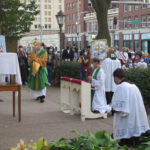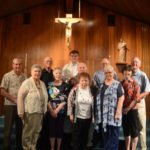Brigades of face mask makers have formed in parishes and small faith groups throughout the Diocese of Davenport to protect health care providers (and now the general public) from contracting COVID-19. However, even the non-sewers among us have an obligation to help protect and affirm health care providers caring for an escalating number of sick patients contracting the coronavirus that can be deadly for the most vulnerable among us.
Health care providers serve on the front lines responding to immediate needs for treatment and in problem solving and innovating to resolve this worldwide healthcare crisis. To be at their best, they need us to be at our best in faithfully following the protocols called for by the Centers for Disease Control and Prevention, our governing bodies and our church.
What does being at our best look like? In a word, sacrifice. Some of our sacrifices come without choice, such as cancellation of elective surgeries, or no visits to hospitals or nursing homes. The vast majority of patients awaiting elective surgery deserve recognition, as they understand and recognize the reasons for this precaution. Doctors still perform emergency and more urgent surgeries, such as fracture care, appendectomies and infections, but every attempt is being made to conserve equipment for the
expected onslaught of COVID-19 cases in the near future, says Dr. Tim Millea, an orthopedic spine surgeon.
Priests and their hospitalized patients also are making sacrifices. “The rule that we’ve been given from all hospitals that we have checked with is that no outside clergy are allowed in to minister in-person to COVID-19 patients; some are restricting all visits by outside clergy to any patient. If possible, they are trying to connect patients and families (and pastors) by phone or other means,” said Deacon Frank Agnoli, diocesan director of liturgy and a former medical doctor. “And this is hard for a church where sacraments, and in-person ministry, are so important. Our priests, deacons and lay ministers are trying to find new ways to accompany others without being physically present.”
Most COVID-19 patients experience mild to moderate illness and remain at home. The diocese has a system in place to provide care for such parishioners. “For the most part, that will have to be by electronic means.” Families who find themselves in this situation are encouraged to call their pastor, so he can accompany them in prayer, whether over the phone or via the Internet. “However,” Agnoli added, “if a priest is needed for the sacraments in an emergency, we have put in place a plan that allows for that to happen in as safe and responsible a way as possible. Bishop Thomas Zinkula will name a priest whose only responsibility will be to provide this direct ministry.”
For non-COVID-19 patients, priests are available for emergencies (following a protocol to keep everyone safe). If a hospital is not allowing outside clergy to visit, chaplains will attend to their needs,” Deacon Agnoli said. “This is a good time to be reminded that, because of privacy laws, parishioners or their families need to take the initiative and let their pastor know someone is sick if they need the church’s ministry.”
The deacon reminds us that “while the sacraments are privileged ways of experiencing God’s grace; they are not the only way. The church’s tradition makes it clear that God’s mercy and grace are not limited by what we can or cannot do because of circumstances that are out of our control. We can, as Pope Francis has reminded us, seek God’s forgiveness directly by making a Perfect Act of Contrition. Since we cannot receive Communion physically, we can do so spiritually. We are not abandoned.”
Remaining at home is another example of a self-sacrificing action. Doing so benefits health care workers and the common good, described as those things that are vital to human flourishing: food, shelter, clothing, health care, education, productive work, fair wages and protection from harm. When we must be out in public, we practice social distancing — keeping six feet apart from one another, limiting interaction to 10 or fewer people, covering our coughs and sneezes and washing hands religiously. As Brian Dugan, a nurse and deacon candidate, reminds us in a story in this week’s Catholic Messenger, “Always think of those around you.”
Lindell Joseph, a professor and director in the University of Iowa’s College of Nursing, offers these suggestions to support and protect health care providers:
• Acknowledge the fears of health care workers on the front line. Their compassion drew them into this field, and may cause them to worry about the possibility of bringing home this disease to their own loved ones. Offer to prepare a meal to deliver to their home or be available to listen to their concerns.
• Donate atomizers to local hospitals for N-95 mask fitting.
• Volunteer to make face masks for your community’s hospital, health clinic, grocery stores or other public places. Search social media for parish groups or parishioners making face masks. Some masks for the general public’s use, don’t require sewing skills.
• Pray for leaders in health care delivery and manual labor in hospitals. Pray for patients and their families and for the people caring for them. Pray for our church leaders to shepherd us through these uncharted territories. Pray for each other.
During this Easter Triduum, we focus our attention on the one who made the greatest sacrifice of all time: Our Lord, Jesus Christ. In our small way, we honor his gift to us with our self-sacrifice for the sake of all humanity in the midst of a pandemic.
Barb Arland-Fye, Editor
(arland-fye@davenportdiocese.org)











